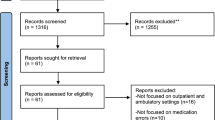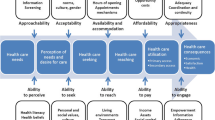Abstract
Background
Racial/ethnic minority patients are more likely to report experiences with discrimination in the healthcare setting, potentially leading to reduced access to appropriate care; however, few studies evaluate reports of discrimination with objectively measured quality of care indicators.
Objective
To evaluate whether patient-reported racial/ethnic discrimination by healthcare providers was associated with evidence of poorer quality care measured by medication intensification.
Research Design and Participants
Baseline data from the Diabetes Study of Northern California (DISTANCE), a random, race-stratified sample from the Kaiser Permanente Diabetes Registry from 2005–2006, including both survey and medical record data.
Main Measures
Self-reported healthcare provider discrimination (from survey data) and medication intensification (from electronic prescription records) for poorly controlled diabetes patients (A1c ≥9.0%; systolic BP ≥140 mmHg or diastolic BP ≥90 mmHg; low-density lipoprotein (LDL) ≥130 mg/dl).
Key Results
Of 10,409 eligible patients, 21% had hyperglycemia, 14% had hyperlipidemia, and 32% had hypertension. Of those with hyperglycemia, 59% had their medications intensified, along with 40% with hyperlipidemia, 33% with hypertension, and 47% in poor control of any risk factor. In adjusted log-binomial GEE models, discrimination was not associated with medication intensification [RR = 0.96 (95% CI: 0.74, 1.24) for hyperglycemia, RR = 1.23 (95% CI: 0.93, 1.63) for hyperlipidemia, RR = 1.06 (95% CI: 0.69, 1.61) for hypertension, and RR = 1.08 (95% CI: 0.88, 1.33) for the composite cohort].
Conclusions
We found no evidence that patient–reported healthcare discrimination was associated with less medication intensification. While not associated with this technical aspect of care, discrimination could still be associated with other aspects of care (e.g., patient-centeredness, communication).

Similar content being viewed by others
References
Kerr EA, Krein SL, Vijan S, Hofer TP, Hayward RA. Avoiding pitfalls in chronic disease quality measurement: A case for the next generation of technical quality measures. Am J Manag Care. 2001;7(11):1033–1043.
Kerr EA, Smith DM, Hogan MM, et al. Building a better quality measure: Are some patients with 'poor quality' actually getting good care? Med Care. 2003;41(10):1173–1182.
Mangione CM, Gerzoff RB, Williamson DF, et al. The association between quality of care and the intensity of diabetes disease management programs. Ann Intern Med. 2006;145(2):107–116.
American Diabetes Association. Standards of medical care for patients with diabetes mellitus. Diabetes Care. 2002;25(1):213–29.
Snow V, Aronson MD, Hornbake ER, Mottur-Pilson C, Weiss KB. Clinical Efficacy Assessment Subcommittee of the American College of Physicians. Lipid control in the management of type 2 diabetes mellitus: A clinical practice guideline from the American College of Physicians. Ann Intern Med. 2004;140(8):644–649.
Snow V, Weiss KB, Mottur-Pilson C. Clinical Efficacy Assessment Subcommittee of the American College of Physicians. The evidence base for tight blood pressure control in the management of type 2 diabetes mellitus. Ann Intern Med. 2003;138(7):587–592.
Sueta CA, Massing MW, Chowdhury M, Biggs DP, Simpson RJ Jr. Undertreatment of hyperlipidemia in patients with coronary artery disease and heart failure. J Card Fail. 2003;9(1):36–41.
Shrank WH, Asch SM, Adams J, et al. The quality of pharmacologic care for adults in the United States. Med Care. 2006;44(10):936–945.
Andrade SE, Gurwitz JH, Field TS, et al. Hypertension management: The care gap between clinical guidelines and clinical practice. Am J Manag Care. 2004;10(7 Pt 2):481–486.
Phillips LS, Branch WT, Cook CB, et al. Clinical inertia. Ann Intern Med. 2001;135(9):825–834.
Schmittdiel JA, Uratsu CS, Karter AJ, et al. Why don't diabetes patients achieve recommended risk factor targets? Poor adherence versus lack of treatment intensification. J Gen Intern Med. 2008;23(5):588–594
Traylor AH, Subramanian U, Uratsu CS, Mangione CM, Selby JV, Schmittdiel JA. Patient race/ethnicity and patient-physician race/ethnicity concordance in the management of cardiovascular disease risk factors for patients with diabetes. Diabetes Care. 2010;33(3):520–525.
Rodondi N, Peng T, Karter AJ, et al. Therapy modifications in response to poorly controlled hypertension, dyslipidemia, and diabetes mellitus. Ann. Intern. Med. 2006;144(7):475–484.
Bolen SD, Bricker E, Samuels TA, et al. Factors associated with intensification of oral diabetes medications in primary care provider-patient dyads: A cohort study. Diabetes Care. 2009;32(1):25–31.
Smedley BD, Stith AY, Nelson AR. Unequal treatment: Confronting racial and ethnic disparities in health care. Washington, DC: National Academy Press; 2002.
Trivedi AN, Ayanian JZ. Perceived discrimination and use of preventive health services. J Gen Intern Med. 2006;21(6):553–558.
Ryan AM, Gee GC, Griffith D. The effects of perceived discrimination on diabetes management. J Health Care Poor Underserved. 2008;19(1):149–163.
Sorkin DH, Ngo-Metzger Q, De Alba I. Racial/Ethnic discrimination in health care: Impact on perceived quality of care. J Gen Intern Med. 2010;25(5):390–396
Perez D, Sribney WM, Rodriguez MA. Perceived discrimination and self-reported quality of care among Latinos in the United States. J Gen Intern Med. 2009;24(Suppl 3):548–554.
Karter AJ, Parker MM, Moffet HH, Ahmed AT, Schmittdiel JA, Selby JV. New prescription medication gaps: A comprehensive measure of adherence to new prescriptions. Health Serv Res. 2009;44(5 Pt 1):1640–1661.
Moffet HH, Adler N, Schillinger D, et al. Cohort profile: The Diabetes Study of Northern California (DISTANCE)--objectives and design of a survey follow-up study of social health disparities in a managed care population. Int J Epidemiol. 2008;38(1):38–47.
Piette JD, Bibbins-Domingo K, Schillinger D. Health care discrimination, processes of care, and diabetes patients' health status. Patient Educ Couns. 2006;60(1):41–48.
Grant RW, Pabon-Nau L, Ross KM, Youatt EJ, Pandiscio JC, Park ER. Diabetes oral medication initiation and intensification: Patient views compared with current treatment guidelines. Diabetes Educ. 2011;37(1):78–84.
Krieger N, Smith K, Naishadham D, Hartman C, Barbeau EM. Experiences of discrimination: Validity and reliability of a self-report measure for population health research on racism and health. Soc Sci Med. 2005;61(7):1576–1596.
Krieger N, Sidney S. Racial discrimination and blood pressure: The CARDIA study of young black and white adults. Am J Public Health. 1996;86(10):1370–1378.
Hausmann LR, Kressin NR, Hanusa BH, Ibrahim SA. Perceived racial discrimination in health care and its association with patients' healthcare experiences: Does the measure matter? Ethn Dis. 2010;20(1):40–47.
Kanaya A, Karter AJ. Diabetes in Asian populations in the U.S. California Diabetes Prevention and Control Program (CDP). California Diabetes Program Issues Brief. 2010. Available: www.caldiabetes.org/content_display.cfm?contentID=1253&CategoriesID=30.
Ash AS, Ellis RP, Pope GC, et al. Using diagnoses to describe populations and predict costs. Health Care Financ Rev. 2000;21(3):7–28.
Bach PB, Pham HH, Schrag D, Tate RC, Hargraves JL. Primary care physicians who treat blacks and whites. N Engl J Med. 2004;351(6):575–584.
Zou G. A modified poisson regression approach to prospective studies with binary data. Am J Epidemiol. 2004;159(7):702–706.
Manze M, Rose AJ, Orner MB, Berlowitz DR, Kressin NR. Understanding racial disparities in treatment intensification for hypertension management. J Gen Intern Med. 2010;25(8):819–825
Heisler M, Hogan MM, Hofer TP, Schmittdiel JA, Pladevall M, Kerr EA. When more is not better: Treatment intensification among hypertensive patients with poor medication adherence. Circulation. 2008;117(22):2884–2892.
Piette JD, Heisler M, Harand A, Juip M. Beliefs about prescription medications among patients with diabetes: Variation across racial groups and influences on cost-related medication underuse. J Health Care Poor Underserved. 2010;21(1):349–361.
Huang ES, Brown SE, Thakur N, et al. Racial/ethnic differences in concerns about current and future medications among patients with type 2 diabetes. Diabetes Care. 2009;32(2):311–316.
Kressin NR, Raymond KL, Manze M. Perceptions of race/ethnicity-based discrimination: A review of measures and evaluation of their usefulness for the health care setting. J Health Care Poor Underserved. 2008;19(3):697–730.
Rothman KJ, Greenland S. Modern Epidemiology. Philadelphia: Lippincott-Raven; 1998.
Chang JT, Hays RD, Shekelle PG, et al. Patients' global ratings of their health care are not associated with the technical quality of their care. Ann Intern Med. 2006;144(9):665–672.
Schneider J, Kaplan SH, Greenfield S, Li W, Wilson IB. Better physician-patient relationships are associated with higher reported adherence to antiretroviral therapy in patients with HIV infection. J Gen Intern Med. 2004;19(11):1096–1103.
Sequist TD, Schneider EC, Anastario M, et al. Quality monitoring of physicians: Linking patients' experiences of care to clinical quality and outcomes. J Gen Intern Med. 2008;23(11):1784–1790.
Saba GW, Wong ST, Schillinger D, et al. Shared decision making and the experience of partnership in primary care. Ann Fam Med. 2006;4(1):54–62.
Bonds DE, Camacho F, Bell RA, Duren-Winfield VT, Anderson RT, Goff DC. The association of patient trust and self-care among patients with diabetes mellitus. BMC Fam Pract. 2004;5:26.
Casagrande SS, Gary TL, LaVeist TA, Gaskin DJ, Cooper LA. Perceived discrimination and adherence to medical care in a racially integrated community. J Gen Intern Med. 2007;22(3):389–395.
Van Houtven CH, Voils CI, Oddone EZ, et al. Perceived discrimination and reported delay of pharmacy prescriptions and medical tests. J Gen Intern Med. 2005;20(7):578–583.
Acknowledgements
This project was supported by a National Research Service Award, grant number HS013853 from AHRQ, and funds were provided by NIDDK R01 DK65664, NICHD R01 HD46113, and NIDDK R01 DK080726. None of the authors had conflicts of interest, and the funders had no role in design and conduct of the study; collection, management, analysis, and interpretation of the data; or preparation, review, or approval of the manuscript. All authors contributed to the conception and design, and drafting and critical revision of the manuscript, including final approval of the version to be published.
Conflict of Interest
None disclosed.
Author information
Authors and Affiliations
Corresponding author
Rights and permissions
About this article
Cite this article
Lyles, C.R., Karter, A.J., Young, B.A. et al. Patient-Reported Racial/Ethnic Healthcare Provider Discrimination and Medication Intensification in the Diabetes Study of Northern California (DISTANCE). J GEN INTERN MED 26, 1138–1144 (2011). https://doi.org/10.1007/s11606-011-1729-2
Received:
Revised:
Accepted:
Published:
Issue Date:
DOI: https://doi.org/10.1007/s11606-011-1729-2




